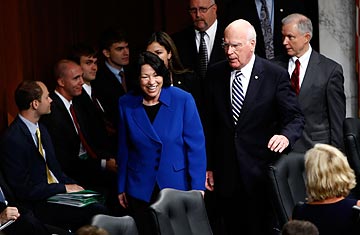
Supreme Court nominee Judge Sonia Sotomayor (L) arrives for her confirmation hearing with ranking member Sen. Jeff Sessions (R-AL) (R) and committee chairman Sen. Patrick Leahy (D-VT) (C) before the Senate Judiciary Committee July 13, 2009.
When Sonia Sotomayor heads to Capitol Hill for the start of her Supreme Court confirmation hearings on July 13, she'll find two groups of players awaiting her: the Senate Judiciary Committee Democrats, who arguably have the easy job to flatter and protect President Obama's pick (Al Franken, the panel's newest member, might also provide some comic relief), and the panel's Republicans, whose primary task is to goad her into saying something inflammatory or indiscreet.
To that end, the seven Republican Senators have prepared four lines of attack. They will express concern about Sotomayor's comments that a "wise Latina, with the richness of her experiences would, more often than not, reach a better conclusion" than a judge from a more homogeneous background. They will focus on her recent Ricci v. Destefano decision, a reverse-discrimination case overturned last month by the Supreme Court. They'll grill her on her interest in foreign law — in their eyes an un-American curiosity that could pollute U.S. laws. And they will fret over her Second Amendment decisions and imply she might want to take away some folks' guns.
The first Hispanic nominee to the nation's highest court sits alone in Room 216 of the Hart Senate Office Building — a larger room than the committee's usual room to accommodate the increased interest — but she comes with the aspirations and expectations of much of the Latino community, as well as a large swath of the Bronx. Three of the four issues on the GOP agenda carry a risk of offending a large part of the Latino community — a group of voters the Republicans have already alienated with their two attempts at immigration reform in 2005 and 2006 and desperately need if they want to one day recover Congress and the White House. It probably doesn't help that the top Republican on the panel, Jeff Sessions of Alabama, was once a federal bench nominee rejected by the same committee for indelicate remarks on civil rights. All of which makes the week as perilous for the GOP as it is for Sotomayor, who, barring a gaffe, looks set to sail past these four hurdles to an overwhelming confirmation vote.
Wise Latina
Sotomayor has used the "wise Latina" phrase repeatedly in speeches dating back to 1994. In one speech in 2001 she tagged on the line "than a white male who hasn't lived that life." Republicans, who prefer judges that claim total impartiality to the law, do not like that Sotomayor's decisions are influenced by her life experience.
"The judge has given a lot of speeches, in addition to her official actions, where she's questioned whether judges can actually be neutral, whether there is such a thing as objectivity in the law, which means that judges are affected by their biases," said Senator John Cornyn of Texas, who serves on the Judiciary Committee. "I think that's a fair area to question her about because certainly the rule of law depends on the same rules applying to each one of us no matter our color, our sex or our ethnicity." Sotomayor defenders say the issue never came up when the Senate confirmed Sotomayor to the Second Circuit Court of Appeals in 1998 and point to conservative Supreme Court Justices Samuel Alito and Antonin Scalia, both of whom cited at their confirmation hearings their backgrounds as Italian Americans as evidence they understand discrimination and the immigrant experience.
Ricci v. Destefano
One of those cases where Sotomayor's personal perspective may have played a role to the detriment of white defendants, the GOP argues, is the recent case of Ricci v. Destefano. The case involved the issue of promoting white firemen in the town of New Haven, Conn. The firemen had all passed a promotions test, but because not enough minorities had passed the test the promotions were turned down in accordance with city policies. The white firemen sued. Sotomayor joined with two other Second Circuit justices on the unanimous opinion in the city's favor. The Supreme Court last month overturned that decision, siding with the white firefighters. "Empathy is great perhaps if you're the beneficiary of it, if the judge is empathetic with you, your side of the argument," Sessions said on the floor of the Senate on July 7. "But it's not good if you're on the wrong side of the argument, if you don't catch a judge's fancy or fail to appeal to a shared personal experience. And this approach to judging as expressed in her speeches and writings appears to have played an important role in the New Haven firefighters case." Sessions went on to note that Sotomayor has been an active member of the Puerto Rican Defense Fund, a group that has criticized the standardized process of testing for such promotions. "And so we're left to wonder, what role did the judge's personal experience play when she heard the case?" Republican witnesses against Sotomayor include Frank Ricci, the top plaintiff in the case, and Lieut. Ben Vargas of the New Haven Fire Department.
The point of these hearings is to allow Sotomayor herself to respond to such criticisms. But hints of her potential answers are already apparent in Democratic responses. "The panel that she was on faithfully applied the Second Circuit precedent, which is what a judge is supposed to do, to follow the precedent of their circuit. And the Supreme Court decision was characterized by press reports as creating a fundamental change in the law," Senator Sheldon Whitehouse, a Rhode Island Democrat, told TIME. "So it's hard to fault her either for not anticipating the Supreme Court's fundamental change in the law or for not embarking herself on a fundamental change in the law."
